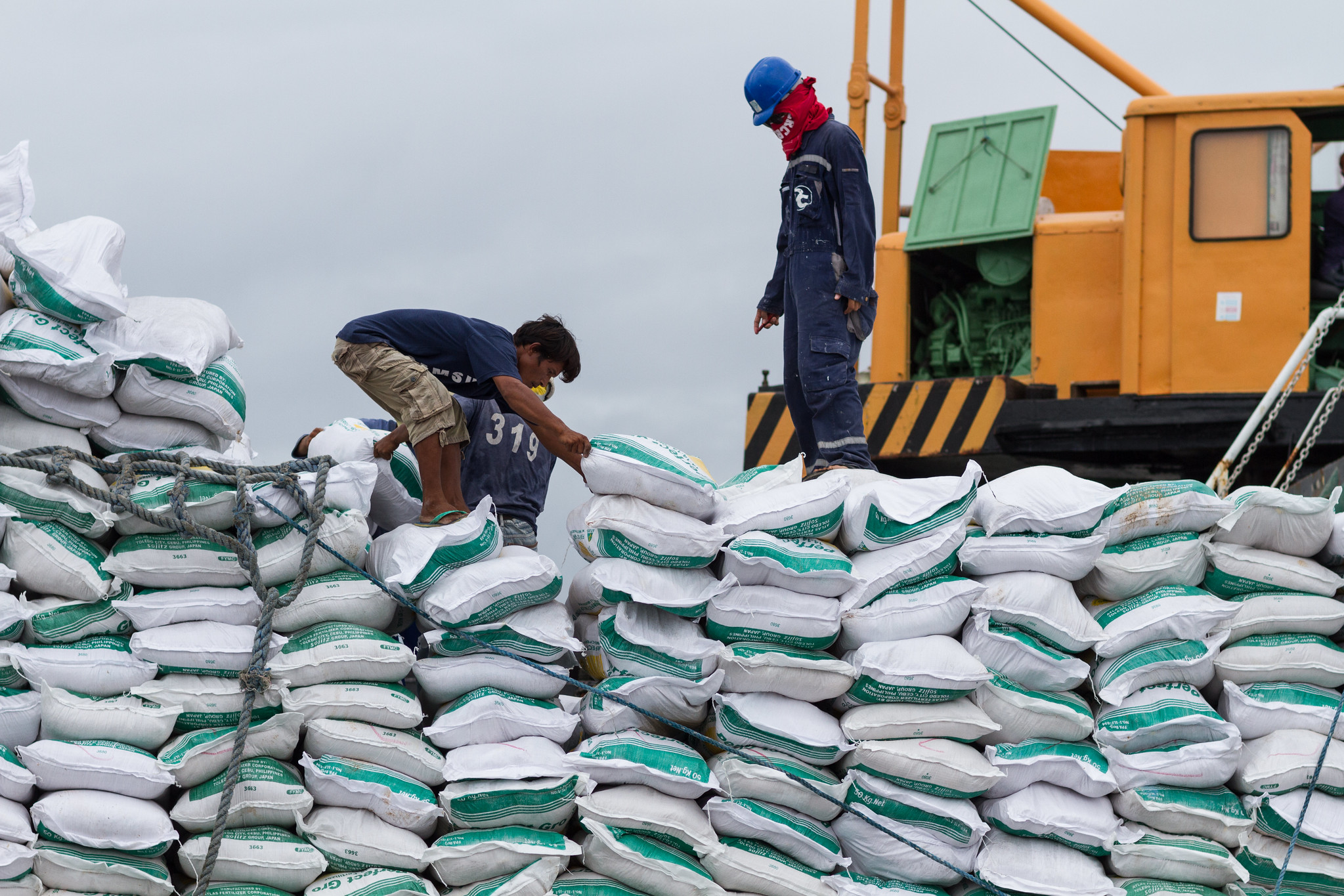Soil erosion is washing farms’ phosphorus down the drain
Experts warn erosion is depleting the essential but scarce soil nutrient
Delger Erdenesanaa • February 17, 2021

Workers load bags of fertilizer at a port in the Philippines. Farmers around the globe apply more than 20 billion pounds of chemical fertilizer each year, but much of it is washed away by soil erosion. [Credit: Adam Cohn | CC BY-NC-ND 2.0]
During the 2008 food crisis, soaring fertilizer prices — which rose alongside the price of food — drove farmers across Africa, Asia and the Middle East to hold mass protests.
More fertilizer shortages could become common, some scientists say, as demand increases and supplies remain limited. A recent study warns that soil erosion from rain and running water is depleting farmland of phosphorus, an essential nutrient for plants. This drain not only compromises crop productivity and farmers’ livelihoods, but also threatens global food security.
On average, farmland worldwide is losing about five pounds of phosphorus per acre each year, the study found. While five pounds may not sound like a lot, many farmers struggle to afford fertilizer to replace any amount of lost soil nutrients, according to environmental scientist and the study’s lead author Christine Alewell from the University of Basel in Switzerland.
Although researchers have previously studied soil erosion’s impact on phosphorus, this study — published September 2020 in Nature Communications — is thought to be the first worldwide assessment to provide specific data for different regions in addition to a global average. Alewell and her colleagues found that Africa loses the most phosphorus to soil erosion — more than eight pounds per acre each year on balance. South America comes in second, losing just under eight pounds per acre.
Nitrogen, phosphorus and potassium are the three primary nutrients that plants need to survive. Although soil erosion carries away all sorts of nutrients, agronomist and president of the Nigeria Institute of Soil Science Ayoade Ogunkunle — who was not involved in the study — says losing phosphorus is the most concerning. Erosion affects phosphorus more than other nutrients because plants rely on microbes in the top layer of soil to process phosphorus into a usable form. That topsoil is what erosion carries away.
And unlike nitrogen fertilizer, which is readily manufactured through a chemical process that harnesses nitrogen gas from Earth’s atmosphere, the phosphorus used in fertilizer cannot be made in factories. It can only be mined from limited reserves of rock phosphate, or recycled from organic waste like animal manure.
Morocco and Western Sahara have large deposits of rock phosphate, but what’s produced from their mines largely leaves the continent due to inadequate transportation infrastructure in Africa and more powerful agricultural lobbies in other regions, according to Alewell. As a result, she says, farmers across Africa sometimes pay six times more for fertilizer than European farmers do.
Despite the money farmers invest in fertilizer, more than two-thirds of what’s applied across the globe is lost to erosion, Alewell says. She and other experts think the problem could grow worse. Ronald Vargas, secretary of the Global Soil Partnership at the Food and Agriculture Organization, says that climate change is causing more sudden bursts of intense rainfall — often after longer dry periods — and these weather conditions exacerbate soil erosion. Vargas was not directly involved in this study, but has collaborated with Alewell’s team on related work.
On top of climate change, the coronavirus pandemic has exposed the vulnerability of agricultural supply chains worldwide, according to both Vargas and Ogunkunle. As a result, Vargas says many farmers lack fertilizer and other necessities, like seeds. In response, the Food and Agriculture Organization is urging farmers to recycle phosphorus and other soil nutrients locally, using manure and compost.
Recycling phosphorus locally can not only mitigate pandemic-induced shortages now, but it can also build sustainable soil fertility in the long term, says Vargas. Fertilizer is like human food, he says, comparing synthetic fertilizer to sugar. “The nutritionists tell you, ‘Don’t eat sugar, because it’s a very fast release.’ That’s exactly synthetic fertilizer.” On the other hand, Vargas adds, organic fertilizer made from manure and compost contains the microbes that help soil maintain a more steady nutrient supply.
Ogunkunle agrees with this approach. Some businesses in Nigeria, he says, are producing organic fertilizer from recycled waste to cope with the phosphorus shortage. Additionally, he says Nigerian scientists are researching ways to combine rock phosphate with organic materials like manure to produce more potent fertilizer.
Other countries, such as Switzerland and China, recycle phosphorus from wastewater, says Alewell. However, replenishing phosphate is at best a bandage over the ongoing problem of soil erosion. As such, Alewell, Vargas and Ogunkunle all emphasized the importance of managing farmland in sustainable ways to address erosion and conserve soil nutrients. Farmers can minimize tillage to keep soil intact, for example, and use mulch and cover crops (plants that cover the soil but aren’t harvested) to protect soil from rain and wind.
“Our response cannot only be focused on one nutrient,” says Vargas. “What we want is to promote sustainable soil management.”